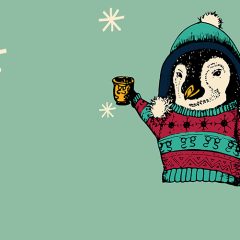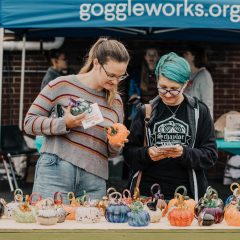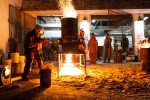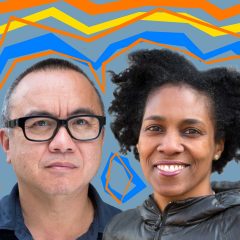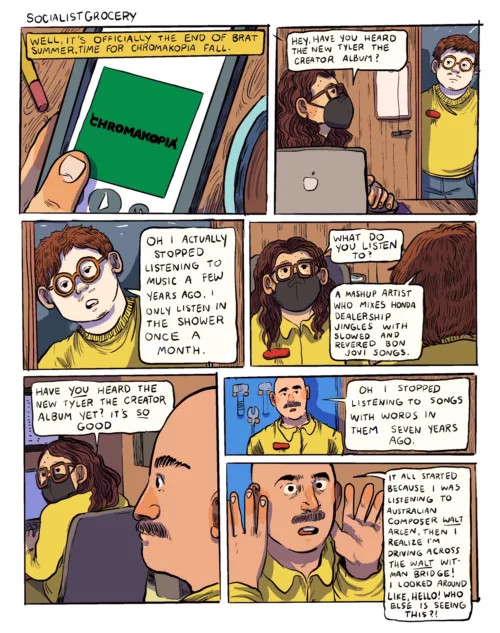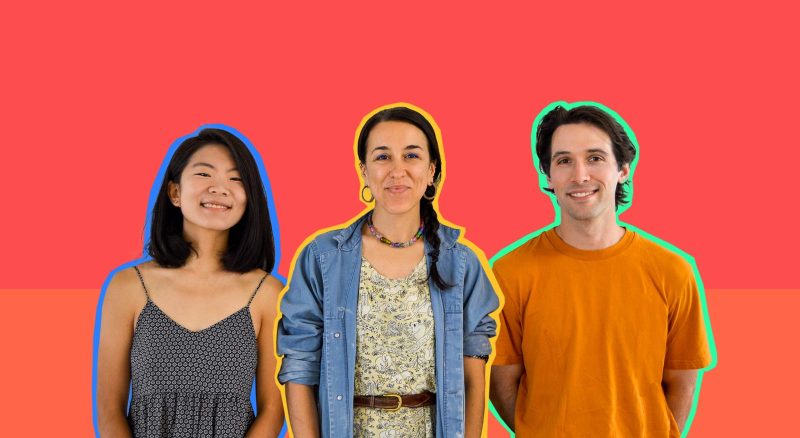
Kate Rusek, a New York artist, Nathan Tietbohl, a Pennsylvania horticulturist, designer and landscape artist, and Janine Wang, wood sculptor, didn’t know each other before coming together in Reading, PA, as the three 2022 Summer Artists in Residence at GoggleWorks. But they were united in what drew them to the residency: the ability to explore their art making in new ways, and with a new community. They also were drawn to GoggleWorks to partake of all the facilities the multi-faceted center for the arts provides. GoggleWorks Center for the Arts has a campus that includes several buildings and a garden. Inside the buildings, there are facilities for metalsmithing, ceramics, printmaking, photography, 3-D printing, virtual and augmented reality and glass blowing, as well as drawing and painting. In the garden, community members and volunteers can chip in on planting and clean up days, and learn about urban farming and food ecosystems. Below is the podcast interview with the artists, who will be showing their work in a culminating exhibit beginning Aug. 12.
The 2022 GoggleWorks Summer Artists in Residents Exhibition will be on view August 12- October 21, 2022, in GoggleWorks’s Cohen Gallery West, 201 Washington St, Reading, PA 19601. You can listen to Artblog Radio on Apple Podcasts and Spotify. Thank you to Kyle McKay for composing Artblog Radio’s original podcast intro and outro!
Transcription
[00:00:12] Roberta Fallon: Hey, welcome everybody, to a special podcast of Artblog Radio! I’m Roberta Fallon, your host. Thanks for joining us.
This podcast is sponsored by GoggleWorks. GoggleWorks Center for the Arts seeks to transform lives through unique interactions with art by offering a space for you to develop skills, get creative and experiment freely. The 145,000 square foot campus in the heart of Reading, Pennsylvania, features 10 teaching studios, 35 juried artists, studios, cultural organizations, wedding and event venues, galleries, a film theater, and more.
I’m very happy to be talking today with the GoggleWorks Summer 2022 Artists in Residence, Kate Rusek, Nate Tietbohl, and Janine Wang. Hello everybody! Welcome.
[00:01:06] Janine Wang: Hi!
[00:01:07] Roberta Fallon: Hi. And congratulations on your residencies. It’s a very unique opportunity. So I wanna hear all about that. I’m gonna quickly introduce you to our audience and then we’ll get into some questions.
So, Kate Rusek is a sculptor and textile artist based in New York City. Kate’s work explores nature, humanity, and the built environment through 3D assemblages made from found materials that mimic natural elements. There’s a lot in there, and we’re gonna in a minute (laughs). Welcome Kate.
Nate Tietbohl is a Pennsylvania based horticulturist, designer and founder of Wildcraft Landscapes– which I wanna hear more about– that’s a design build service, committed to ecologically responsible practices. Hi Nate!
[00:02:01] Nate Tietbohl: Hello, happy to be here.
[00:02:03] Roberta Fallon: Great. And Janine Wang is a New York native now living in Philadelphia. We’re so happy you’re in Philadelphia! Thank you. An artist, educator, and crafts person, Wang’s practice includes furniture making, works on paper, and fine crafted objects. So Janine welcome. I’m very happy with all three of you being here and for GoggleWorks to support this podcast.
Let’s start with a question open to all of you. Actually, all the questions are really gonna be open to all of you. So, a little awkward, but we’ll get past that. The GoggleWorks summer residency is a 10 week juried live-work residency– so you’re living in situ there– uh, that started in early June and ends in early August.
What drew you to the residency and prompted you to apply? Let’s start with Kate.
[00:02:55] Kate Rusek: Ooh, hot seat. Um, so I have been kind of circling GoggleWorks for a little while. I am, uh, in a place in my practice and my career where I am looking for these types of opportunities to really have some concentrated work time. And I’m open to being flexible, and moving studios, and kind of allowing that flexibility of location and surroundings to kind of influence my practice, but also like, bring what I do to different places and see how it unfolds.
And GoggleWorks has been just like, very attractive in the fact that it is like, ginormous and has these beautiful studios. It just, like the facilities here are like really world class, I think they rival, any of like the sort of, schools of craft that I can think of in this country, and some of the like really well renowned artist retreats that really launch people’s careers and their, um, emerging stages. And so that, that sort of possibility of what could happen with the support, and the facilities, and just the expertise that I knew I would encounter here, um, was just like terribly exciting.
I mean, so much of my practice is about exploratory processes, um, where I kind of let intuition, and my body, and what feels good, inform the structures that emerge. And so that kind of energy, and that kind of space, is like very ripe for my creative practice.
[00:04:32] Roberta Fallon: Cool. Thank you. How about you Nate?
[00:04:35] Nate Tietbohl: So I, uh, I have the good fortune of being a Berks County– which is where Reading is located– native. And so I grew up here, went away for a time, and have recently kind of found my way back. And the GoggleWorks has always been a space that I’ve enjoyed spending time in, as, you know, somebody taking the classes that they offer, and, um, engaging with the community, as well, um…
And so I’ve kind of, in a tertiary way, been following this year of the, the garden space. And with my background in environmental science and horticulture, I’ve been very interested to follow what they’re doing. There’s been quite a bit of press about it, It’s a new venture for them, getting out of the, you know, “traditional art mediums” and thinking about art in the landscape.
And, a real passion of mine is the accessibility of nature in, um, in our everyday lives, you know? That’s a big part of what Wildcraft Landscapes was about, was kinda bringing a, uh, connection with local ecology and ecosystems into a residential landscape. And I think a lot of the times we see that in public spaces showing up in a $5 million dollar massive park in New York City, that’s landscaped with native plants, has beautiful nature play elements, but doesn’t really feel… that’s not a scale of project that’s really accessible to a lot of communities and doesn’t really fit every type of infill development.
And so what I really saw with the residency was an opportunity to develop a model of working at a much smaller scale, but creating that same kind of impact of really bringing in nature, bringing in opportunities to directly interact, and working with the resources. And the community connections of the GoggleWorks seemed like a really way to do that in a, in a manner that can not only sustain itself, but has the connections, and the reach, to perpetuate itself. And really be a model and a case study in, in creating those kind of spaces on a, on a smaller scale.
You know, the garden’s about 5,000 square feet, which, uh, is partially divided up into agricultural space, and then is partially an under story planeing. So there’s a lot of kind of micro climates to play with, and, um… Yeah, it just has a lot of potential. And that was the appeal to me, was bringing nature in, in smaller public spaces.
[00:07:25] Roberta Fallon: Very cool. Janine, how about you? Why are you at GoggleWorks?
[00:07:30] Janine Wang: (laughs) That was very beautifully said, Nate, um… I think, I’m here maybe more for more similar reasons to Kate? I come from a production woodworking background, or, I used to work in a shop where every medium was available to me, it kind of felt like? Like we had a ceramics part of the shop, and metalworking, CNCing, woodworking. And all of that was available to me, I just didn’t have the time to– you know, during the work day– to actually use it.
But I kind of saw how my bosses were using every different medium, and just using the most appropriate thing to make something work. I’ve always (well, more recently) been a very, like, “I can just do it myself” kind of a person, so I started on top of my wood shop with my partner, to collect, like… to start educating myself about ceramics, and of all the other mediums, but, that is a slow process.
So when I saw the Goggle works residency, pop up and have all of these, like Kate said, like world class facilities just available to you to jump in and just try something… Cause you know, a lot of the process of learning by just “doing” is just “try it.” So like you, if you have an idea, and you don’t know if it’s been done before, or you haven’t seen it happen in person, you can just jump in and try it. That is definitely what drew me to this residency, um, on top of the very specific project that I wanted to work on.
So having the staff support, and also the technical support, and all facilities available here, has been really exciting. And really productive.
[00:09:16] Roberta Fallon: Wow. That’s cool. Well, I’m gonna stick with you Janine, because you mentioned about your specific project that you wanted to do at GoggleWorks. So what is the project you want to do? And then we will go to Nate and Kate after you.
[00:09:33] Janine Wang: I am… somehow, I became a Wood Turner by trade? Which, um, it’s my specialty, and everything I do kind of revolves around it, including like, the furniture making the object making. And through wood turning, I’ve developed– well, I immediately connected to the craft because of the ease and accessibility of creating doubly curve surfaces, which the human body really, really likes, um…
There’s– in my opinion– there’s no other medium like it, you can just like walk up to a piece of wood and turn it into a curve that your hand or your body immediately loves, and it’s warm, it’s malleable, and it holds up against you.
In 2018. I was the student resident at the Center for Art in Wood, where I worked on an entire collection of vessels that were based around gestures of the hand. So I’ve always really liked handles, and the idea that the handle is like the “hand” of the object. Like, especially when it comes to woodworking, the maker also speaks through the object, cause they put their hands all over the thing, and it informs how you make. So I made a series of vessels based on hand gestures, turned into like, wood turned forms, and developed a… a language? Or like, a “wood turn vernacular?”
But what was frustrating to me was, I really wanted to be able to live with the objects that I made, but since they were turned wood and had to be made once, and each one was like, really perfect… um, You wouldn’t really wanna pour coffee into a wooden cup that took like 10 hours to turn and finish.
So I’ve always, always– ever since 2018– wanted to create that series in ceramics. So that you could then make it functional, and make it possible- like make it more accessible, and make it possible to actually live with thing without treating it so preciously.
[00:11:36] Roberta Fallon: Oh, interesting.
[00:11:37] Janine Wang: That’s what I’m doing now.
[00:11:38] Roberta Fallon: So you’re trans… translating into a new medium. That’s pretty cool!
Okay, how about, uh, Nate? Talk about the garden- what in particular are you doing in the garden?
[00:11:53] Nate Tietbohl: Quite a few different things, um, as I think any landscape project really entails. I think a big part of it is kind of creatively addressing the legacy of the space. It was developed some years ago as a plant nursery, as well as the spot where the students come could come to. And then, um, in 2018, 2019, it kind of just became too much for the school to manage and things got a little.. Got a little overgrown, um, but…
Yeah, you know, it was landscaped in the early 2000’s, so we’re talking a lot of Euonymus, which is an invasive species, classified as invasive species, in much of the Northeast now; Liriope, and other plants, that don’t necessarily fit into a… creating a healthy ecosystem. Which is essential for having that kind of biodynamic agriculture that they’re hoping for in the space.
And so, yeah, there’s an element that is kind of a re… repurposing, you know? There was a pile of pavers that now have become some nice, curving, raised beds for the garden. The Euonymus hedges that I’m clearing out are getting woven into, uh, large, kind of sculptural forms? And we’re collecting donations of materials, natural materials, logs, branches from arborists, and stripping them down, and combining them to create nature play elements as well as places that folks can sit on for a landscape painting class, you know, if they, venture across the parking lot from the, uh… from the upstairs studios.
And so trying to make it work both as the place for students in the school to come down and just play in, but also as a functional, kind of gallery, and space for the artists, and the various studios on campus to utilize.
And so I’m bringing the landscaping background, as well as bringing my artistic practice, in the way of kind experimenting with, uh, sculptural elements, and bringing my background– my hobbyist background– in wood turning, and woodworking, to create some other elements for the space. Yeah, yeah.
[00:14:31] Roberta Fallon: We have two wood turners on this podcast! to mention that. often does that happen in the real world?
[00:14:38] Nate Tietbohl: A professional, and an amateur…
[00:14:42] Roberta Fallon: Skill level doesn’t matter! You both do it. I can’t even imagine. I mean, more power to you, the wood turners.
Okay, Kate! Talk about, what are you making exactly during your residency? What precisely are you making?
[00:15:00] Kate Rusek: So I am doing a little bit of a mash up series of work. I am really here to… I wanna take a full advantage of the facilities that are here. And so I’ve branched out into ceramics, which has been very, very exciting. But I also brought sort of a form gestating, body of work with me that I had started at the beginning of the year that was sort of a riff on a one-off piece that I made in 2016 called “Now let’s get information.”
And that piece was a series of reclaimed birth control envelopes from my… my life, um, assembled into a form that was intuitive, but based on the shapes and what the material was capable of. Some of this work is behind me, in progress. I have really sort of like, exploded and extrapolated those formal elements into the concepts of thinking about environmental health, and climate anxiety, and, uh, body autonomy, and integrating some personal narrative of my own reproducing body…
And the excitement of introducing ceramics into this work is that it integrates some of my background in mold making and kind of reintroduces that as like a mode of repetition, that like weaves so sort of seamlessly into the formal elements that I’m attracted to in my sculpture. And so to learn it in a new medium and be pouring… pouring ceramic in like, multitudinous (laughs) small elements to integrate both into the textile works, and then to explore form in ceramic specific pieces, just is…. It becomes like a really ripe, and fertile ground to help me think more conceptually about what this work means.
Like I, really love that process of allowing my creative intuition to guide me through the work that I’m making. And the meaning comes with it. I know some people plan their series of work based on a project or like, you know, do a series, do like a good, like some research, and then like design pieces that like that says “this” about “this piece of research.” And like, “here it is.” But for me, intuition and, finding delight in the making of my work is like, so dramatically important to making me feel alive as an artist, and alive as a human, and making sense of the world, that I’m really just… I’m leaning wholeheartedly into that in my time here and what I’m making, and with what I’m making.
And it’s so beautiful to be supported in that sense, the sort of like creative unknown, figuring it out and, um, making it all work together to find that creative depth.
[00:18:11] Roberta Fallon: Very cool. Nathan, I wanna ask you about interacting with the community at GoggleWorks. GoggleWorks is a very community-centered space. They offer all these things, but they don’t offer it without the context of community. It’s all about growing a community to appreciate and love art and each other– I think– in Reading. Which is a great mission.
So I would think you being outside in the garden space, even though it’s hot, uh, you may have encountered some of the community members, or even the school? It is summer and there’s no school, right? So there’s no kids in the garden. So talk to us about the community interactions that you’ve had, any stories you can say or anything like that.
[00:18:59] Nate Tietbohl: Yeah, I think… I think it is very interesting- you know, the gardens is just barely separated from the GoggleWorks campus by a, a two lane road. And I think just that, I think gives a very different experience than the time that I’m spending on campus, and the wonderful people that I’m interacting with there, um… You know, people aren’t walking their dogs through, you know, through the parking lot.
So yeah, I’ve had a lot of people stop in. I’ve had some really wonderful conversations with, uh, folks who are curious about the space, you know, people who have stories about growing up gardening, or stories of playing in the woods. I’ve been able to learn quite a bit about the history of the space. Where the garden was actually used to be a, uh, a train track, that brought coal into the- what’s now the GoggleWorks campus, when it was a factory in the 1900’s and the 20th century.
And yeah, so getting to have those interactions, being able to take a lot of feedback from people and let that influence and adapt the designs… You know, hearing, you know, “this hedge is blocking the view from the street,” you know, “what can we do about this?” And that… that was a priority for me to get rid of, but it was very affirming to hear that that was a, uh, a point of issue for a lot of the community members.
You know, we’ve had people stop by just to say thank you, quite often, for just tidying up the space, you know? I think, you know, it’s hard when you’re living in a community to see a space that hasn’t been stewarded and hasn’t been, hasn’t been taken care of. And so I think there’s a lot of excitement by folks to see that initiative, and that hard work, going into really making a space– uh, working on making a space, you know, it’s a work in progress– but, beginning the process of making a space that really feels like the community can come into it, you know?
We have people stopping by with their kids, walking around the neighborhood, you know, coming in, you know, picking some apples, you know, what have you. And there’s real… There’s real excitement about having a space like that. Yeah.
I mean, and also I think a, a component of it is connecting in with other organizations in the community, uh, Berks Nature is our local nature conservancy that does fantastic education work and land stewardship. And I’ve done some work with them in the past, I taught a workshop this spring and have been really fortunate to keep that- to have that connection to rely on and say, “Hey, we need volunteers” or “I’m gonna be going out next week,” and, uh, helping them cut back more invasive species in their parks to then use for further, uh, sculptural elements in that space.
And so there’s a immediate connection with the community to get feedback and have them in a very conversational way, steer what’s happening in the space, and then there’s organizational interest and that kind of community, um, beyond GoogleWorks’s campus, that’s been really rewarding to get to connect with, and bring in.
[00:22:29] Roberta Fallon: Sounds excellent. Janine, have you had any community experiences you’d like to share?
[00:22:36] Janine Wang: Um… I’ve been walking a lot. (laughs) I’m a little bit directionally challenged, so when I get to a new city I have to walk, cause otherwise, I just.. I don’t know where I am. I can’t orient…
The other thing about new cities- it’s the food. Like, you get to just try a whole bunch of different foods, all with like a clean slate. I’ve been loading up on (laughing) a whole bunch of like, Latin food while I’m here, um, I was pretty surprised to find, one of the first things I learned about reading was that it is 85% Spanish speaking. And that is reflected in the food, which is all really delicious.
it’s been fun and also challenging to– we were recommended by the GoggleWorks staff to, if we know any Spanish at all, to try to use it when we’re out and about. And I have brought out a lot of my high school Spanish (laughing) when ordering food, and even just talking to people on the street, and in line. Everybody’s really friendly. Reading is definitely the kind of town where people say hi on the street, whether or not they know you and give you a huge smile.
Oh- beeping at pretty girls is a thing too, I found? (laughs) Which is, I was very… I was very put off by at first, but, um, they’ve been nothing, but like really, generous and complimentary… Just like, *beep beep* “Hey, you’re beautiful” or like, “Have a wonderful day…” um… It’s been fun. (laughs)
[00:24:26] Roberta Fallon: Are- are you, by comparison, saying that doesn’t happen in Philadelphia so much?
[00:24:31] Janine Wang: Oh, no!! No, no (laughs). Yeah, I… it’s…. If it happens in Philadelphia, it definitely… It would come off as a little more sinister than it does here.
[00:24:44] Roberta Fallon: (laughs) That’s the big city for you.
[00:24:47] Janine Wang: Mm-hmm
[00:24:48] Roberta Fallon: How about you, Kate? Any interactions with community you’d like to shout out?
[00:24:53] Kate Rusek: Well, I think my, like… My biggest touchpoint has been just spending hours and hours in the ceramic studio. You know, the way they’ve set it up here is just really beautiful. It’s like there are a few different levels of membership, or interaction, that you can have with spaces.
And it really is kind of choose your own adventure, like come in with whatever skills you have or your background or your goals, and you can experiment, and try, and like, get better or learn something new. If you ask– literally, if you just ask. You know, there are classes that are offered if like, you really know there’s this one thing you wanna learn, but it’s a pretty active space.
So I see frequently, the same people, like either throughout the week or on the same days of the week. And it’s just really nice to kind of, you know, poke and prod people a little bit, in like a friendly way, about what they’re making, and why they’re making it, and like, you know, what they get out of it, and like what they’re, you know, what they’re trying to achieve. And then if they’re interested in what I’m doing, like I’m like happy to share that too.
And I think that makes me feel like integrated in the community, which is amazing. Cause like, we are new to this and they don’t have to, you know, people don’t have to be so generous with their time or like, their like sort of like shared, creative processes, but they are. I’ve had like really, really wonderful chats with people about why they’re making the certain things that they are, and like, you know, whether they like sell it, or whether it’s gifts for friends or if it’s, you know, like a skill building thing.
There’s like a wonderful fellow who’s just so rigorous about her time. Like, she’s a college kid, and she just is doing… like, sort of boldly going towards whatever feels right for her. Like she’s exploring her feelings through her ceramics and it’s like, “Yes, child. Yes, children,” like “Live that life,” like, “Have that be, like, the center; make that the center of like, your creative well, and like, it will be.. It will keep feeding you, it will like, feed into the world and… make us all better for it.”
So it’s just, it’s been really nice, just to like, just have these casual questions, like, have these kind of casual interactions with people and, um… You know, kind of talk shop a little bit. But also like, you know, have that creative exchange that is just like, really nurturing and nourishing.
[00:27:17] Roberta Fallon: That’s cool.
[00:27:20] Nate Tietbohl: Could I– Could I jump in with one quick anecdote that just came up as, uh, Kate was talking? Cause I think… the people who spend time on the GoggleWorks campus love the GoggleWorks and it’s community. And I popped into the fuse glass studio. And one of the women who’s in there during the open studios, named Sue, said, “Hey, you’re working in the garden- I have over a hundred solar lights that I use decoratively in my yard. For the opening reception on August 12th, I would love to bring those in and help you and Tiana decorate and light the space, so we can be over there in the evening.”
And that’s just someone in the community with a love and passion for making the space sing. And I just, you know, you see that so much. And I just- I had to shout out Sue for that offer to, to help out.
[00:28:16] Roberta Fallon: Thank you, Sue! That is a beautiful story. I love that story. Thanks for sharing that.
You seem to be really busy and focused, each one of you, on what you’re doing. And I know that residencies are short-lived and it’s not like you’re looking for a best friend forever to come out of it. But I’m wondering if you’ve had the opportunity to exchange ideas and… I mean, you seem to have common thoughts about the place of people in the world in relation to materials, and you know, their bodies.
So, yeah, how’s it been being together? You share a common space in your studio. Anybody wanna go first on that?
[00:29:02] Janine Wang: Maybe just an extension on what the conversation we’re just having about community– it is vastly different to be in a studio that’s shared with other artists and to have those, like totally natural conversations that just spontaneously occur, versus what I usually do, is I work alone with my partner. And I know what he thinks already (laughs) because, we’re the only opinions that the other person usually gets on our work.
So personally it’s been really amazing to just ask Nate and Kate questions about their work, even if we’re just passing by, we’re like having breakfast and barely caffeinated, to learn things that we never would’ve before, share resources, like names of other artists that were interested in, it’s just felt like really lovely and natural.
[00:29:57] Roberta Fallon: That’s really cool. Nate, have you gotten in on that vibe since you work outside, mostly?
[00:30:03] Nate Tietbohl: I really have, I feel so fortunate to have gotten to know these, these two wonderful humans. You know, I think the best example is, you know, anytime you are– at least in my experience– anytime I’m passing through the space or I’m like, “I’m gonna pop in and grab something,” you know, we share, you know, a three bedroom kind of townhouse– and conversations just happen, you know? You’ll be like, “Oh, hey!” And then 30 minutes later, there’s this like, wonderful, invigorating conversation that just kind of came out of brushing into each other.
Yeah, I mean, I- I could talk for a while. I really have such respect for the, the craft that these two bring to their work, and their background and everything… It’s very inspiring for me to see that level of commitment, you know? As somebody who, you know, I feel like, is kind of exploring and trying to find my, uh, voice and bring together a lot of different things, you know.. To see two individuals that are really, really just fantastic artists, has been very inspiring.
Yeah, I mean the first day that I was in here, Janine, I was talking about doing these stick weavings, and Janine is like, “oh my gosh, I teach basketry courses, and I weave, and weaving with woodworking and turned pieces, let me log you into a, to a online course that I did recently, and you can watch the, you know, watch the videos and the tutorials, to learn some more things that will be helpful for your weaving.” It’s been immensely helpful.
And so that, that kind of support… Yeah, it’s just been wonderful, you know, and just, you know, in a social sense too, you know, we there’s a lot going on; we’re you know, tired some days and just, you know, having people that are kind of in it with you and have their own perspectives on it, I think is really… Yeah, has just… you know… At least for me, I hope, I think for all of us– left us all feeling, you know, very supported by one another, as well.
[00:32:10] Kate Rusek: what else can I add to that? I mean, I, I second, everything that everyone has said. But I think it’s just, I think it’s something really special to like, have creative minds that are working in this way, and be in this, the same space, because I think, even though our work either looks disparate or is like, you know, in different, in different mediums, um, and we’re in disparate spaces, like for the primary, primary, like production of it… I just think like that aspect of problem solving in artists is so universal. And I think it is- you do, as Janine mentioned, like you do kind of get mired in your… in yourself, and in your own mind sometimes, or your own like, circles?
And so to have someone to just talk shop with and like, you know, kind of bounce something off, like, “I’m struggling with this. Like, I can’t figure this out.” Like, you know, we all have these like, extraordinary backgrounds of things we’ve worked with, or experiences that we’ve had, and we can bring that to each other, to help– maybe not immediately solve the problem– but at least like jog memories, or like jog an idea.
And then in some cases, like Nate was mentioning like, offer these skills directly to like, (laughing) um, “how did you know that I needed this?” And then you have this, and then this is like, this is like synchronicity that like I could never, ever plan.
Yeah. So I think like, in terms of community building, like, this residency specifically has been like, so fruitful in that way and this like, what I love, love, love about like, being able to get out of my zone and into this like, very specific, like un-reproducible, space between the three of us in this sense. And it’s just like, it’s so, so valuable.
[00:33:53] Roberta Fallon: I am blown away by the love Fest that just went on. This was so it was very beautiful. Thank you. And now we need to end up, so I’m gonna say, thank you for speaking with me today, it’s been lovely. I’ve been talking with the three summer artists and residents at GoggleWorks: Kate Rusek, Nate Tietbohl, and Janine Wang.
And everybody should go see their show at GoggleWorks, opens, the grand opening is on August 12th. Be there. And see the 100 lights in the garden and all the other work in the galleries. Thank you all so much. And I am signing off for now. This is Roberta Fallon for Artblog Radio. Come back next time.
Bye bye.
[00:34:40] Kate Rusek: Thanks.
[00:34:41] Janine Wang: Bye.
[00:34:42] Roberta Fallon: Thank you all. Thank you.


